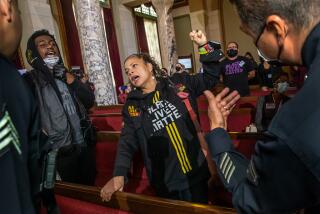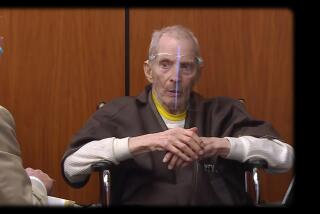Durst arrest warrant should be ‘thrown out,’ attorneys say
Reporting from Houston — In the latest legal wrangling over Los Angeles murder suspect and New York real estate scion Robert Durst, his attorneys on Tuesday challenged his recent New Orleans arrest and underlying search warrants as unconstitutional.
Durst, a suspect in the 1982 death of his wife, Kathleen, is described in the filing as a “frail, 71-year-old man in poor health.” He is being held without bond after being arrested by FBI agents at a Canal Street hotel March 14.
He was arrested in connection with the death of Los Angeles author and friend Susan Berman 15 years ago, shortly before police were expected to question her about Kathleen Durst’s disappearance.
In Robert Durst’s room at the J.W. Marriott, investigators from the Louisiana State Police found a .38 revolver and marijuana and charged him with possession of a firearm by a convicted felon and possession of a firearm in the presence of a controlled substance.
“Louisiana has to prove the lawful search of that room to get the gun and marijuana in” to court, Durst’s lead attorney Dick DeGuerin, told The Times on Tuesday at his Houston office. Durst is expected back in court Thursday for a preliminary hearing in New Orleans.
Orleans Parish Assistant Dist. Atty. Mark Burton has defended the state search and arrest warrants, and at a hearing last week argued that Durst’s attorneys would have to wait until they get to California to challenge the Los Angeles arrest warrant.
DeGuerin and New Orleans co-counsel Billy Gibbens argue in their latest motion to have Durst’s arrest warrant thrown out that the search of his hotel room by state investigators was “warrantless” and that his previous convictions do not prohibit him from possessing a firearm in the state.
They said that Louisiana does not bar all convicted felons from owning guns, just those who committed particular crimes – not including Durst’s prior federal convictions for possession of a firearm by a fugitive from justice and interstate shipment of a firearm by a person under indictment.
When two FBI agents confronted Durst in the hotel lobby at 3 p.m., they had yet to receive a search warrant, according to the court filing.
“The FBI frisked Mr. Durst in the lobby and found no weapons or contraband, but they removed Mr. Durst’s room key from his jacket pocket,” the filing says.
“At that point, the agents should have released Mr. Durst, because it is undisputed that during the encounter in the lobby the FBI agents did not know that a California arrest warrant had been issued.”
Durst’s attorneys said that had the agents known, “they should have taken him to jail right away…. If agents had reason to search the room – and they did not – they should have secured the room and obtained a search warrant.”
Instead, Durst’s attorneys note, “The FBI escorted Mr. Durst to his hotel room and held him there, incommunicado, for almost eight hours” taking inventory while they contacted Los Angeles police.
At 6 p.m., the FBI agents “began a warrantless general search of Mr. Durst’s hotel room and discovered a gun in a coat hanging in the closet and marijuana in sealed luggage.” Durst’s attorneys note that “there was no contraband in plain sight.”
At 11 p.m., Durst was booked on the California arrest warrant on suspicion of murder.
“The California murder warrant is one page long, lacks a probable cause statement and does not authorize a search,” Durst’s attorneys note in their filing.
At 2 a.m., LAPD Det. Michael Whelan applied for a Louisiana search warrant for Durst’s hotel room -- room 2303, according to the filing.
“Nowhere in Detective Whelan’s warrant application does he inform the court that room 2303 had already been searched by the FBI. The search warrant purports to seek a handgun, which Detective Whelan knew the FBI had already found,” the attorneys note.
The attorneys argue that a “rambling” affidavit Whelan swore out and attached to the search warrant, which was not included in the New Orleans case file and which Los Angeles police have refused to release, contains “misrepresentations and omissions rendering it invalid,” including “events from 1982 to the present … references to anonymous letters, newspaper articles, television reports, and speculation about the death of Susan Berman and the disappearance of Kathie Durst.”
The affidavit also presents handwriting analysis by two experts concluding that Durst wrote a note to police shortly after Berman’s death alerting them to a “cadaver” – without notifying the court that one of the handwriting experts had reversed himself, “an intentional misrepresentation that justifies quashing the search warrant,” the attorneys argue.
The following day, Louisiana State Trooper Saunders Craine applied for an arrest warrant for Durst on the state charges based on the search warrant Whelan had applied for the day before and citing the evidence recovered during a “subsequent search of Mr. Durst’s hotel room.”
“Trooper Craine well knows the revolver and marijuana were not discovered subsequent to the issuance of the search warrant,” Durst’s attorneys wrote, calling the hotel room search a “constitutional violation.”
Christopher Bowman, an assistant district attorney with the Orleans Parish district attorney’s office, did not return calls or respond to email late Tuesday. Court staff said the office had not filed a response.
Follow @mollyhf on Twitter.
More to Read
Sign up for Essential California
The most important California stories and recommendations in your inbox every morning.
You may occasionally receive promotional content from the Los Angeles Times.











